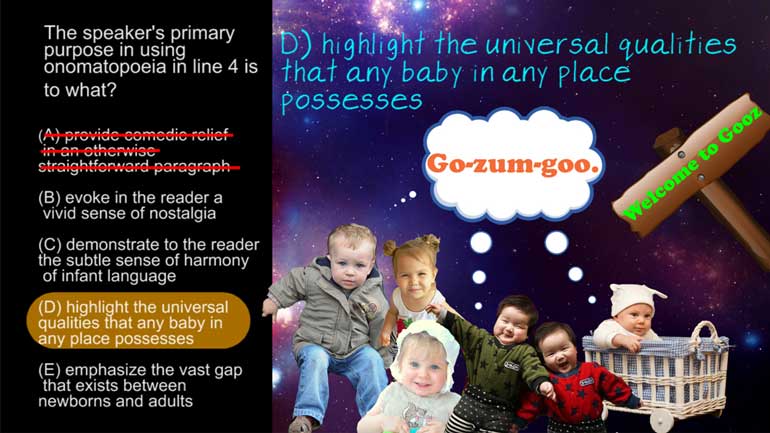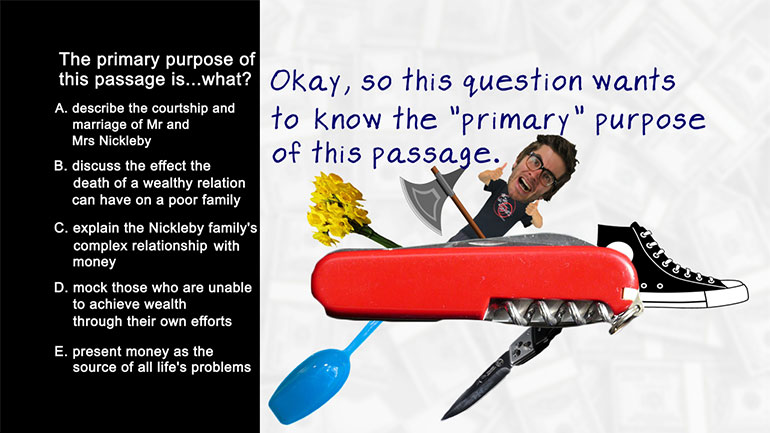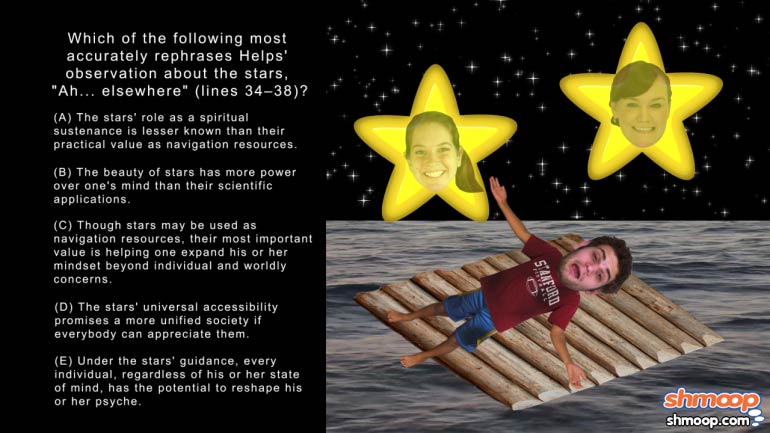ShmoopTube
Where Monty Python meets your 10th grade teacher.
Search Thousands of Shmoop Videos
AP English Language and Composition 7.6 Passage Drill 32 Views
Share It!
Description:
AP English Language and Composition 7.6 Passage Drill. The chief purpose of the "historical inquiry" in paragraphs 4-7 is most likely to what?
Transcript
- 00:04
And here's your shmoop du jour brought to you by the question mark.
- 00:08
Remember the Riddler there is no such thing as a stupid question mark.. well allow us to revise that.
- 00:13
come on guys all right check out the following passage we're just going to
- 00:17
check this one out really quickly because it's tiny fun and while they
- 00:21
clearly got paid by the word....
Full Transcript
- 00:30
okay moving on the chief purpose of the historical
- 00:34
inquiry in paragraphs four through seven beginning line 26 is most likely to what?
- 00:40
and here the potential answers..
- 00:44
all right, well the great Henry Ford famously grumbled history is bunk in other words [Framed picture of Henry Ford]
- 00:49
the past doesn't have much bearing on the present while the author begs to
- 00:53
differ he states that scientific ratiocination a fancy way of saying
- 00:58
observation and reasoning began as blind intellectual instinct or simple [A statue with vague facial features]
- 01:04
observation and eventually came to be viewed as one continuous series of
- 01:09
causes and effects the author that fashionable fellow with killer side burns [A cigarette and a man on fire running away]
- 01:14
was a big proponent of Charles Darwin serious evolution but that doesn't mean [Man with Charles Darwin's head wearing a giant finger]
- 01:19
he's basing the theory of evolution on how science has evolved which means A
- 01:23
can't be the one, option C is referenced in the article in fact it says that
- 01:27
human instinct is the root of historical inquiry but it's just that the root the [Lots of tree roots on a floor]
- 01:33
start, the earliest stages where it all begins not the whole shebang, C is
- 01:37
out of here. Once called natural history the research of organisms habits then
- 01:42
came to be known as natural philosophy and has further progressed to merge with
- 01:46
what we call physical science think of those classes that give us the shivers [girl shivering in class]
- 01:51
just hearing the name like you know biophysics and biochemistry, well these
- 01:56
advanced sciences however been developed in more recent years so the terms [students picking up jars in a laboratory]
- 02:00
physical science and natural history didn't have exactly the same meaning
- 02:04
they do today although, Ford is still Ford.
- 02:06
Alright well E sounds pretty good but the author's point regarding historical
- 02:11
inquiry is not about the series of causes and effects that is phenomena of [A hedgehog on a woods' floor]
- 02:15
nature so we'll nicks E and then there's B this is the last level of our video
- 02:20
game that is historical inquiry of the phenomena of nature again this is just [A mario videogame mushroom]
- 02:25
one piece one part of the bigger picture so B is a no-go and that just leaves D as
- 02:29
the answer in paragraph five our fabulously sideburn friend says it is
- 02:34
only when the mind passes beyond this condition that it begins to evolve
- 02:37
science so the knowledge of science that we know and love today is a result of [woman using a pipette in a lab]
- 02:42
progressing from that blind intellectual instinct the viewing the phenomena of
- 02:46
nature as what it is one continuous series of causes and effects we'll give old
- 02:52
Henry Ford a pass on that whole history is bummed thing, after all he did also say
- 02:56
failure is simply the opportunity to begin again this time more intelligently [Henry Ford wearing a pink bow tie and purple shades]
Up Next
AP English Language and Composition: Passage Drill Drill 1, Problem 2. What is the speaker's primary purpose in using onomatopoeia in line four?
Related Videos
AP English Literature and Composition 1.1 Passage Drill 7. The primary purpose of this passage is what?
Wishing upon a star may help you pass your AP English Language and Composition test, but answering this question would be a safer bet.
Take a look at this shmoopy question and see if you can figure out which device the speaker employs the most.
Feel like shifting gears and answering a question about shifting tones? We've got you covered. Take a look at this question and see if you can foll...




